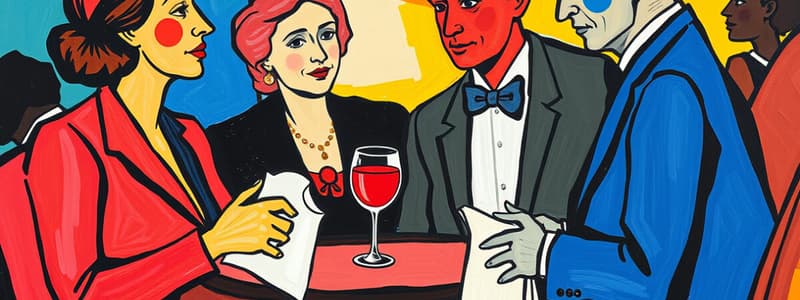Podcast
Questions and Answers
What does the essay emphasize about the words "please" and "thank you"?
What does the essay emphasize about the words "please" and "thank you"?
- They are essential in softening conflicts. (correct)
- They have no real impact on relationships.
- They can create financial advantages.
- They are often ignored in daily interactions.
According to the essay, why is the lift-man's reaction to the passenger considered excessive?
According to the essay, why is the lift-man's reaction to the passenger considered excessive?
- Refusing a polite request does not warrant violence. (correct)
- He was stressed due to work demands.
- Physical aggression is justified in such scenarios.
- The law supports the lift-man's perspective.
How does the essay characterize bad manners?
How does the essay characterize bad manners?
- They result in social isolation. (correct)
- They should be punished by law.
- They can lead to criminal charges.
- They are legally recognized offenses.
What would be the consequence if society could retaliate against bad manners, according to the text?
What would be the consequence if society could retaliate against bad manners, according to the text?
What rationale does the essay provide for the law not addressing bad manners?
What rationale does the essay provide for the law not addressing bad manners?
What is suggested about the impact of bad manners compared to criminal behavior?
What is suggested about the impact of bad manners compared to criminal behavior?
Which statement reflects the author's view on the legal system's ability to handle social civility?
Which statement reflects the author's view on the legal system's ability to handle social civility?
According to the author, what can be more painful than a physical injury?
According to the author, what can be more painful than a physical injury?
How does the author describe the emotional effects of bad manners on individuals?
How does the author describe the emotional effects of bad manners on individuals?
What does the author imply regarding emotional abuse compared to physical abuse?
What does the author imply regarding emotional abuse compared to physical abuse?
Flashcards are hidden until you start studying
Study Notes
The Value of Good Manners
- Good manners enhance social interactions and lead to happiness, while bad manners are anti-social.
- The law does not punish bad manners, leaving individuals feeling vulnerable to rudeness.
- Words like "please" and "thank you" play a crucial role in diffusing tensions and fostering civility.
Incident with the Lift-Man
- An incident involving a lift-man demonstrates how rudeness was escalated unnecessarily.
- The lift-man's demand for "Top please" was ignored, leading to an escalation of violence which was not justified.
- Legal systems protect individuals from violence but cannot regulate manners.
Social Impact of Bad Manners
- Bad manners can negatively impact social cohesion and emotional well-being.
- An insult can be more damaging than physical harm, often leading to broader emotional turmoil.
- Emotional abuse, often stemming from bad manners, is more common than physical abuse, highlighting the severity of rudeness.
Importance of Civility
- Social norms dictate that civility is required, even if not legally enforced.
- "Please" and "Thank you" are essential small courtesies that encourage cooperative and pleasant social interactions.
- Good manners reflect a sense of respect and consideration for others, promoting harmonious relationships.
The Polite Conductor
- A specific bus conductor exemplifies natural courtesy and good manners, impacting passengers positively.
- The conductor’s considerate actions range from accommodating the elderly to providing pleasant interactions with children.
- His demeanor encourages a culture of kindness among passengers, illustrating how individual politeness can uplift collective experience.
Journey with a Kind Bus Conductor
- The conductor's interactions demonstrate how positivity can be contagious, brightening the day for others.
- The narrative highlights that good manners are essential for a tolerant society.
- Politeness serves as a critical component for social harmony, reminding us of the importance of everyday civilities.
Politeness as a Personal Victory
- Practicing politeness represents a triumph over negative tendencies and self-interest.
- The story of Chesterfield illustrates customs surrounding courtesy, emphasizing that civility contributes to mutual respect in society.
Studying That Suits You
Use AI to generate personalized quizzes and flashcards to suit your learning preferences.




